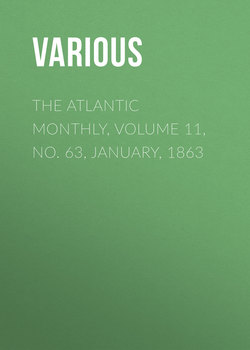The Atlantic Monthly, Volume 11, No. 63, January, 1863

Реклама. ООО «ЛитРес», ИНН: 7719571260.
Отрывок из книги
Long ago, when you were a little boy or a little girl,—perhaps not so very long ago, either,—were you never interrupted in your play by being called in to have your face washed, your hair combed, and your soiled apron exchanged for a clean one, preparatory to an introduction to Mrs. Smith, or Dr. Jones, or Aunt Judkins, your mother's early friend? And after being ushered in to that august presence, and made to face a battery of questions which were either above or below your capacity, and which you consequently despised as trash or resented as insult, did you not, as you were gleefully vanishing, hear a soft sigh breathed out upon the air,—"Dear child, he is seeing his happiest days"? In the concrete, it was Mrs. Smith or Dr. Jones speaking of you. But going back to general principles, it was Commonplacedom expressing its opinion of childhood.
There never was a greater piece of absurdity in the world. I thought so when I was a child, and now I know it; and I desire here to brand it as at once a platitude and a falsehood. How ever the idea gained currency that childhood is the happiest period of life, I cannot conceive. How ever, once started, it kept afloat is equally incomprehensible. I should have supposed that the experience of every sane person would have given the lie to it. I should have supposed that every soul, as it burst into flower, would have hurled off the vile imputation. I can only account for it by recurring to Lady Mary Wortley Montague's statistics, and concluding that the fools are three out of four in every person's acquaintance.
.....
"How can I?"
The whole world of society spoke in the poor manager.
.....